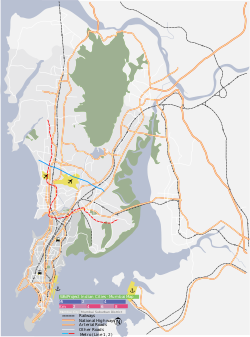Sewree
| Sewri | |
|---|---|
| neighbourhood | |
| Coordinates: 19°00′N 72°52′E / 19.00°N 72.86°ECoordinates: 19°00′N 72°52′E / 19.00°N 72.86°E | |
| Country | India |
| State | Maharashtra |
| District | Mumbai City |
| Metro | Mumbai |
| Languages | |
| • Official | Marathi |
| Time zone | IST (UTC+5:30) |
Sewri is a locality along the eastern edge of South Mumbai, in Maharashtra, India. It is also the name of a railway station on the Central Railway Harbour Line.
Sewri (pronounced as Shivdi) was a small hamlet on the eastern shore of the Parel island, one of the original seven islands of Bombay. Sewri has a fort that dates back to 1770. The Agri-Horticultural Society had established gardens at Sewri, which were acquired in 1865 by Arthur Crawford, then the Municipal Commissioner of Bombay, for building a European cemetery. Large parts of Sewri belong to the Bombay Port Trust and were incorporated into the harbour facilities. In 1996, the mangrove swamps of Sewri were declared a protected ecology. Lesser flamingoes from other parts of India come to these mangroves to breed. They arrive at the mudflats from the months of October to March every year. These mudflats are near the Sewri jetty, which is a 20-minute walk from the railway station.
The Rafi Ahmed Kidwai Road (RAK marg) which consist of four adjacent roads begins at Sewri and ends at Maheshwari Udyan (Matunga) near King's Circle station. Fatima High School can be found at the beginning of the RAK road. The Sewri Christian Cemetery, the largest of its kind within city limits, is located here.
Sewri East houses a number of industrial units especially those of Petrochemical industries. Sewri West is largely residential, consisting of housing societies like Sewri koliwada, BDD Chawls, Mulraj Bhuvan. The Mulraj Bhuvan Group (MBG) is also a very famous club in this area known for its sporting and social activities. built by British in year 1925, Dnyaneshwar Nagar, Shivaji Nagar, Gulmohar Society, Labour Camp and Bhatwadi. The market area is called "Sewri Naka".
Opening up of mill lands and the Mumbai Port Trust lands for development has resulted in a lot of construction activity in this area. The (Sewri-Nhava Sheva transharbour link), which is being planned by the Mumbai Metropolitan Region Development Authority (MMRDA), threatens the habitat of the migratory flamingoes.ari
...
Wikipedia

